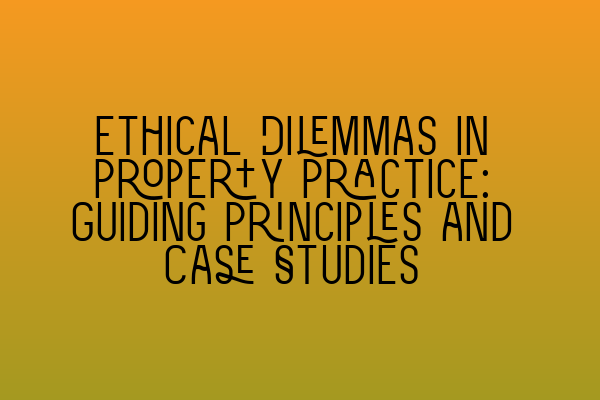Ethical Dilemmas in Property Practice: Guiding Principles and Case Studies
Welcome to the SQE Property Law & Land Law blog, where we delve into the complexities of ethical dilemmas faced by property practitioners. In today’s post, we will explore the guiding principles that should govern property practice and examine real-life case studies to illustrate these principles in action.
The Importance of Ethical Practice in Property Law
In property practice, ethical considerations are paramount to maintain public trust and uphold the integrity of the legal profession. Clients rely on property practitioners to navigate complex transactions and safeguard their interests. Practitioners must adhere to ethical standards to ensure fairness, transparency, and accountability throughout the process.
At SQE Property Law & Land Law, we believe that by discussing and analyzing ethical dilemmas, we can enhance the skills and knowledge of property practitioners and promote a culture of ethical excellence in the field.
Guiding Principles for Ethical Property Practice
When faced with ethical dilemmas, property practitioners can turn to the following guiding principles to navigate complex situations:
- Confidentiality: Practitioners must maintain strict client confidentiality, ensuring that sensitive information remains private and protected.
- Conflict of Interest: Property practitioners must identify and address any conflicts of interest that may compromise their ability to act in their clients’ best interests.
- Honesty and Integrity: Practitioners must communicate honestly and act with utmost integrity in all dealings. They should avoid misrepresentation or misleading statements.
- Fairness: Property practitioners must treat all parties involved in a transaction fairly and impartially. They should not discriminate based on race, gender, age, or any other protected characteristic.
- Competence: Practitioners should maintain and enhance their professional knowledge and skills in order to provide competent advice and representation to their clients.
- Client Care: Property practitioners must prioritize their clients’ interests and welfare, acting in their best interests and communicating effectively throughout the process.
Case Studies: Ethical Dilemmas in Property Practice
Let’s now delve into some real-life case studies to illustrate how these guiding principles apply to ethical dilemmas in property practice.
Case Study 1: Conflict of Interest
In one case, a property practitioner was approached by both the buyer and the seller in a transaction. As the practitioner had previously represented the buyer in a different matter, a conflict of interest arose. The practitioner promptly disclosed the conflict to both parties, seeking their informed consent and recommending independent legal advice. This demonstrated the practitioner’s commitment to the guiding principle of addressing conflicts of interest.
Case Study 2: Confidentiality
In another case, a property practitioner inadvertently mentioned details of a client’s property transaction to a friend during a social gathering. Recognizing the breach of confidentiality, the practitioner promptly apologized to the client and put measures in place to prevent such incidents in the future. This case highlighted the importance of maintaining strict client confidentiality, even outside the office environment.
Case Study 3: Honesty and Integrity
A property practitioner discovered a critical error made by the opposing party that would benefit their client. Instead of capitalizing on this error, the practitioner promptly alerted the opposing party and proposed a fair resolution. This exhibited the practitioner’s commitment to honesty and integrity, setting an example of ethical conduct for others in the field.
Conclusion
Ethical dilemmas are an inevitable part of property practice, and understanding the guiding principles can help property practitioners navigate these challenges effectively. By upholding confidentiality, addressing conflicts of interest, and acting with honesty and integrity, practitioners can ensure ethical excellence in their day-to-day practice.
If you found this post informative, you may be interested in our related articles:
- SQE 1 Practice Exam Questions
- SQE 1 Practice Mocks FLK1 FLK2
- SQE 2 Preparation Courses
- SQE 1 Preparation Courses
- SRA SQE Exam Dates
Thank you for reading. Stay tuned for more insightful content on ethical dilemmas in property practice from SQE Property Law & Land Law.
